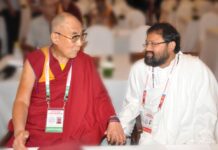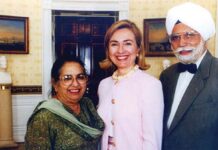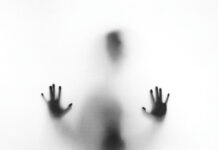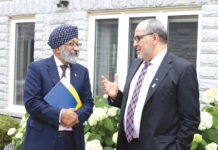The Beatles India connection influenced the music band’s later psychedelic work

TORONTO: The Beatles.
For music fans, 1960 seems like yesterday. That was the year the famous English band was formed in Liverpool.
Even though early Beatles music is considered to be ‘mop top pop’ music (a reference to their ‘mop top’ hair), their later more psychedelic work was influenced by Indian culture, music and religion.
Though George Harrison had messed around with a sitar that he borrowed from some Indian musicians during the filming of the movie Help in 1965, it wasn’t until Roger McGuinn of The Byrds made him hear an album by Pandit Ravi Shankar at an LSD fuelled party in Zsa Zsa Gabor’s mansion in the US later that year, that George became serious about it.
Upon his return to London, he bought a sitar from a store called India Craft and incorporated its music into the song ‘Norwegian Wood’ on their revolutionary album Rubber Soul, the first time ever that a Western musician actually used a sitar in a recorded western song! That song and album forever changed the course of music produced in the 60s!
The following year George Harrison met Panditji Shankar in Kashmir and honed his sitar skills and he then started using it in many of the Beatles songs even influencing other rock musicians like The Rolling Stones, Donovan and Led Zeppelin to incorporate Indian instruments in their music. It was the dawn of a new era.
Indian instruments became so much a part of western music that Pandit Ravi Shankar and his partner Ustad Alla Rakha (tabla) were invited to perform at famous music festivals such as Monterey Pop (1967) and Woodstock (1969). They also performed at the spectacular ‘Concert for Bangladesh’(1971) which was staged by George Harrison, Eric Clapton, Ringo Starr and many other top musicians. At this concert, Pandit Ravi Shankar asked the packed auditorium to ‘please stop smoking (marijuana)’, before he started playing.
READ ALSO: Summer jam of 1973 was the biggest concert in US history
Besides George’s connections with India, John, Paul and Ringo also had their moments. From experimenting with LSD and Indian music, their interest turned to spiritual matters and the next logical step it seemed was to check out the Hindu religion. They first met Maharishi Mahesh Yogi at the London Hilton in 1967 and then along with Mick Jagger (The Rolling Stones) and many others went to Bangor, Wales, for his training camp. Ringo could not make it due to the birth of his child.
They were so impressed by his technique of Transcendental Meditation (TM) that they decided to quit LSD and go down to Rishikesh to learn more the following year.
During their stint at this retreat (Rishikesh), it is said that they had their most prolific musical composition moments writing and composing 48 songs in a few short weeks! Eighteen of those songs appear on the famous Beatles White double album, some on Abbey Road and many in solo works after the Beatles disbanded.

Some songs like ‘Dehradun’ still remain unreleased. From this ashram, Ringo was the first to leave, then Paul. George and John stayed on a bit longer until they left abruptly as they got disillusioned, as per their statements, by the Maharishi’s financial savvy and lecherous sexual activities which they felt were unspiritual.
When asked by the Maharishi why they were leaving, John retorted “well, if you’re so cosmic, you’ll know why.’
Even though they left, it is said that all the Beatles – John Lennon, Paul McCartney, George Harrison and Ringo Starr- were forever transformed by their various trysts with India, its cultures, mores, music and religion.
It is especially evident in all of George’s solo works notably his classic ‘My Sweet Lord (Hare Krishna, Hare Rama)’.
It is also a constant theme in John’s work. Paul as everyone knows is vegetarian and started the ‘Become vegetarian every Monday’ movement. Ringo also speaks highly of Indian culture.
The common notion is that initially way back in the 60s, The Beatles were responsible for boosting and expanding awareness and interest in the West about India’s customs, religion and yoga. But since then the continued strong interest is because of the inner strength and ethos of India and its culture. [Updated version of the original article]
READ ALSO: When the Beatles were straight and clean before Bob Dylan turned them to marijuana









Hi Tam,
Please also note that whatever prompted their departure from Rishikesh – it is said that their most productive and innovative period was during their stay there (for Ringo a short period and for John and George almost two months). Also they grew a lot spiritually. Lots of positive effects from their association with the Maharishi. Still some unreleased songs from those times. And even Ringo felt creative juices flowing through him.
Hi Tam,
I am quite aware of all the follow-up that happened post John and George’s hurried departure from the ashram. As a matter of fact, I even attended the 2009 benefit concert. I was just relating what happened at that particular point in time.
Anyways, thanks for the follow-up. I am sure all readers would love to read about it.
I am sure that you know there is a lot more to the story than what can fit in 750 words and in the number of words in your reply.
The writer’s explanation of the Beatles so-called disillusionment with Maharishi is a personal interpretation but is not based on facts. Contrary to gossip, Maharishi was never found to have misused funds in his non-profit organization, nor was there evidence of any other form of misbehavior. John Lennon made a mistake and later admitted it.
Most diehard Beatles fans have figured out the true story about the Beatles’ experience in India and their involvement with meditation, and involvement that still persists for the two surviving Beatles. All it takes is a little research.
For more you might read: “Maharishi and the Beatles: What Really Happened” http://meditationasheville.blogspot.com/2010/12/maharishi-and-beatles-what-really.html
Or the New York Times article on Maharishi: “The Man Who Saved the Beatles.”
The Beatles did not actually get disillusioned with Maharishi. John did for a while, but that had more to do with John’s state of mind at the time than with Maharishi. John Lennon succumbed to rumors circulating in Maharishi’s ashram, fabricated by a Beatles hanger-on (“Magic Alex”) who was admittedly jealous of Maharishi, but even John changed his tune after a few years and phoned Maharishi to apologize for the disgruntled departure and unkind words. None of the other Beatles or their wives ever believed the false rumors. This is clear from their writings and public statements after the group left India, especially statements from recent years.
George Harrison practiced Maharishi’s Transcendental Meditation technique till the end, and also performed a benefit for TM in the 1990s.
Paul and Ringo also kept meditating. Paul brought his daughter to visit Maharishi many years after India. In 2009 at Radio City Music Hall, Paul and Ringo performed a historic benefit concert to raise money to teach TM to one million school kids – along with several other meditating musicians.
We hope you are satisfied with Mr Balani’s response to your comments.